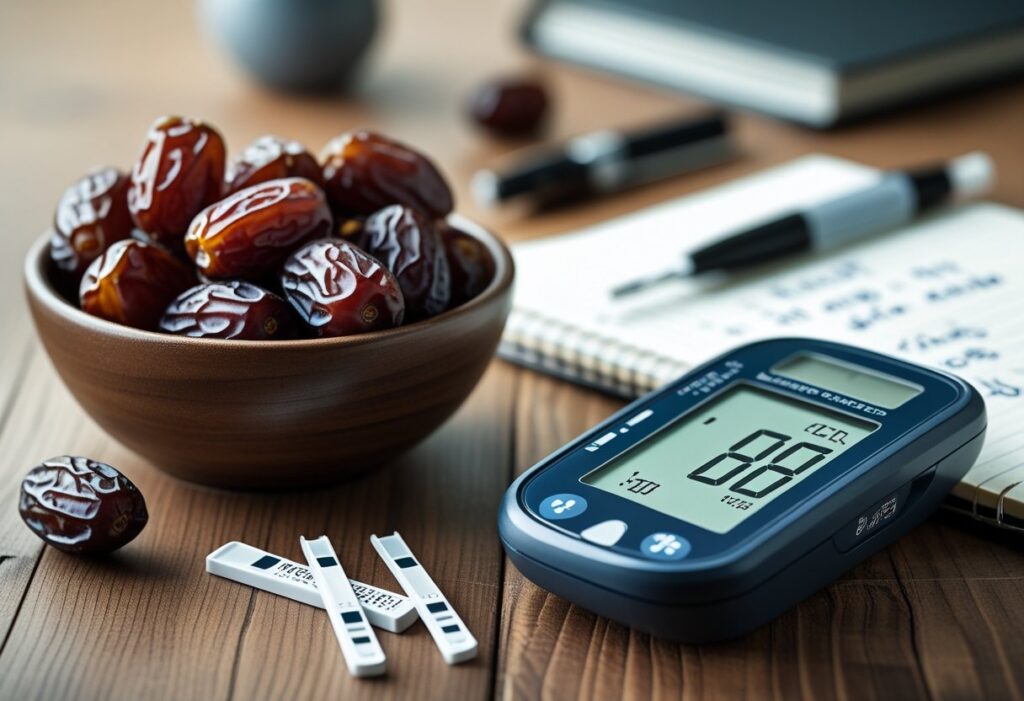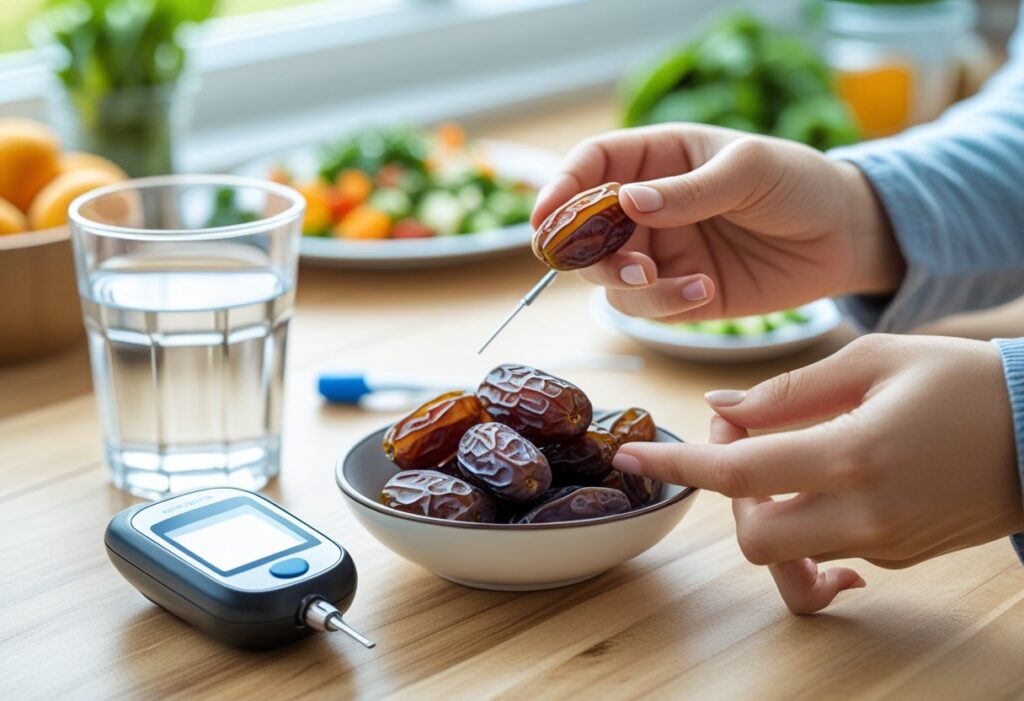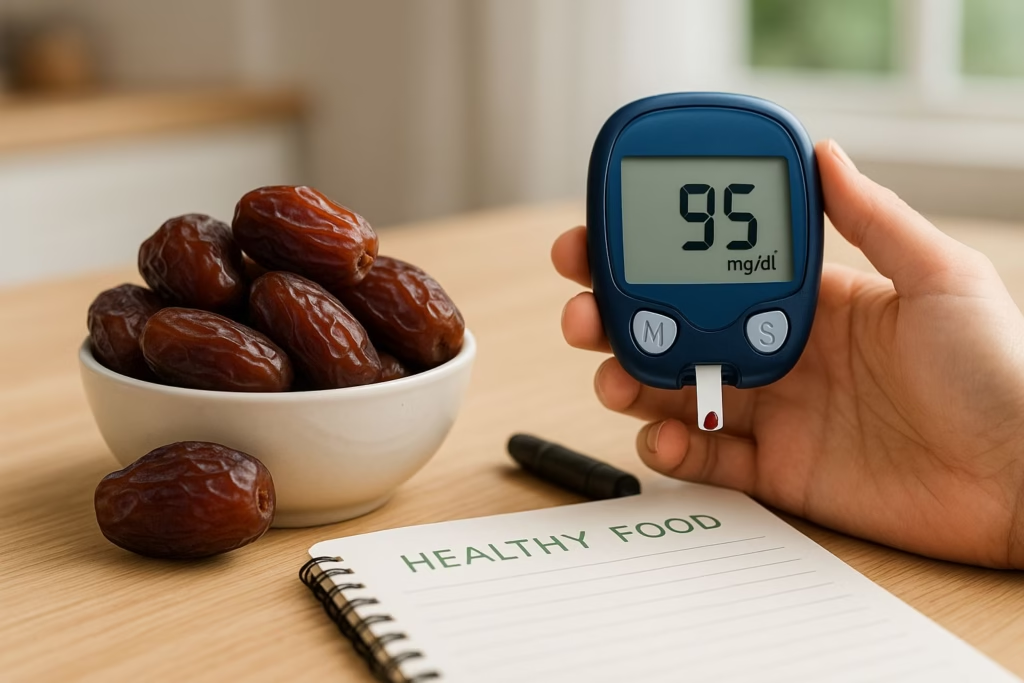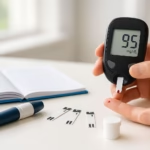Dates are a natural sweet fruit, and their reputation for raising blood sugar often makes people with diabetes a bit wary. But research actually shows you can include dates in a diabetic diet—if you stick to moderation, like 2-3 dates per day, you won’t see harmful spikes in blood sugar.
Their fiber content and moderate glycemic index help slow sugar absorption. Honestly, that makes dates a better pick than most other sweets.
Sure, dates have natural sugars, but they also bring antioxidants and minerals to the table—stuff that can support your health. Some studies even hint that dates might help lower fasting and post-meal blood glucose levels.
If you’ve got diabetes, it’s still a good idea to watch your portion sizes. Pairing dates with proteins or healthy fats can help keep blood sugar swings in check.
Key Takeways
- Dates can fit into a diabetes-friendly diet if you eat them in moderation.
- Nutrients in dates might support blood sugar control and your overall health.
- Portion control and smart food pairing help manage blood sugar after eating dates.
Dates and Their Effects on Blood Sugar

Dates come loaded with natural sugars, and how they affect your blood sugar depends on the type and how many you eat. Their glycemic index and glycemic load shift from one variety to another, which changes how quickly sugars get into your bloodstream.
If you want to dodge blood sugar spikes, portion control is non-negotiable, especially for people with diabetes.
Natural Sugars and Blood Sugar Response
Dates mainly have glucose, fructose, and sucrose. Each one hits your blood sugar differently.
Glucose gets absorbed fast, bumping up blood sugar within 15–20 minutes. Fructose, though, is slower, since your liver handles it, so you get a more gradual rise.
This mix means dates give you a quick bump in energy, then a slower release. The fiber in dates also slows things down, so you don’t get that sharp sugar spike you’d see with pure sugar or most processed sweets.
Glycemic Index and Glycemic Load of Dates
The glycemic index (GI) for dates jumps around based on type and where they come from. Some Saudi Arabian dates hit a GI of 43 to 75, while UAE and Egyptian dates are more in the 30 to 57 range.
Lower GI means slower sugar release—definitely better for blood sugar control. Glycemic load (GL) takes into account both GI and the actual carbs in a serving, so it’s a more real-world measure for folks managing diabetes.
| Date Type | Approximate GI | Glycemic Load (per serving) |
|---|---|---|
| Saudi Arabian Sellag | 74.6 | Moderate to high |
| UAE Khalas | 35-55 | Moderate |
| Egyptian Zaglool | 30.3 | Low to moderate |
Blood Sugar Spikes and Portion Control
If you eat a pile of dates, you’ll see your blood sugar shoot up—no surprise, given their sugar load. People with diabetes really need to keep an eye on portions to avoid sudden blood glucose increases.
Most studies say 2 to 3 dates per day is safe and doesn’t cause wild blood sugar swings. Pairing dates with fiber, protein, or healthy fats can slow down sugar absorption even more.
But honestly, portion control is everything. Even with a moderate glycemic load, eating too many dates can overwhelm your body’s insulin response, which is the last thing you want for blood sugar management.
Can Diabetics Eat Dates Safely?

You can fit dates into a diabetic diet, but you’ve got to be thoughtful about it. Knowing how many to eat, what to pair them with, and picking the right types makes a big difference in blood sugar management.
Counting carbs and balancing your meals with protein and healthy fats are both important. It’s not rocket science, but it does take a little attention.
Recommended Portion Sizes
Portion size really matters for diabetics when it comes to dates. One Medjool date packs around 18 grams of carbs.
If you eat 2–3 dates, you’re looking at 36–54 grams of carbs, which can impact blood sugar if you’re not careful. A moderate portion—like 1 or 2 dates at a time—keeps things manageable.
Count those carbs as part of your daily total, and check your blood sugar after eating dates to see how your body reacts. Adjust as needed—everyone’s different.
Pairing Dates With Other Foods
When you eat dates with a protein or healthy fat, like nuts, you slow down carb absorption. Almonds or walnuts are great choices for this.
If you want to go the extra mile, toss in some fiber-rich fruits like apples or berries. That combo makes for a balanced snack that won’t send your blood sugar on a rollercoaster.
Try 2 dates with a handful of nuts for a snack that’s sweet, filling, and way less likely to spike your glucose.
Types of Dates and Their Impact
Not all dates are created equal—some are bigger and sweeter, like Medjool, so they come with more carbs per piece. Ajwa dates are smaller and less sweet, so you get fewer carbs.
Dried dates are more concentrated, so they hit your blood sugar harder than fresh ones. Still, both types have a low glycemic index, so eaten in moderation, they raise blood sugar slowly.
If you want to keep carbs down, pick smaller or less sweet dates. Always check the serving size and carb content, no matter the type.
If you’re unsure, talk to your healthcare provider. For more details, check out Healthline’s article on dates for diabetes.
Nutritional Profile and Health Benefits of Dates
Dates are sugary, sure, but they also offer a lot more. You’ll get fiber, antioxidants, and minerals like potassium and magnesium—stuff your body needs.
That fiber slows sugar absorption, antioxidants help fight inflammation, and vitamins and minerals support heart health. So, when you eat dates in moderation, they’re actually a pretty useful food choice.
Fiber in Dates and Sugar Absorption
Dates have a good amount of soluble fiber, which slows digestion and the release of sugar into your blood. That gives you a more gradual blood sugar increase—crucial for folks with diabetes.
The fiber also helps your gut and keeps things moving. By slowing sugar absorption, fiber cuts the risk of blood sugar spikes after meals.
Even though they’re sweet, the fiber in dates helps keep things balanced. That’s probably why moderate daily date consumption doesn’t mess with HbA1c, an important blood sugar marker.
Antioxidants and Inflammation Reduction
Dates are loaded with antioxidants like flavonoids, phenolic acids, and carotenoids. These help protect your body from oxidative stress, which is a player in diabetes complications and other chronic diseases.
The antioxidants in dates lower inflammation, which tends to run high if you have diabetes. Less inflammation means better blood vessel health and maybe a lower risk of heart disease.
Some folks think dates might help protect the liver and boost immune responses, thanks to their antioxidant content. Their natural anti-inflammatory effects are a nice bonus for overall metabolic health.
Vitamins, Minerals, and Heart Health
Dates have a solid mix of minerals: potassium, magnesium, and manganese. Potassium helps keep blood pressure in check, magnesium supports your muscles and nerves, and manganese is good for metabolism and bones.
You’ll also get a bit of B vitamins and vitamin K for energy and blood clotting. These nutrients all help support heart health by lowering cholesterol and improving lipid profiles.
Some evidence even says eating dates can lower total cholesterol and LDL (“bad” cholesterol”), which is a win if you’re worried about heart disease.
| Nutrient | Role in Health |
|---|---|
| Potassium | Lowers blood pressure |
| Magnesium | Supports muscle, nerve function |
| Manganese | Aids metabolism and bone strength |
| B vitamins | Energy production |
| Vitamin K | Blood clotting |
Incorporating Dates Into a Diabetic Diet
You can fit dates into a diabetic meal plan if you’re careful. Portion control and balancing out their sweetness with other foods are the real tricks.
Knowing how to use dates helps you manage carbs and blood sugar. It’s not complicated, but it does take a little planning.
Using Dates as a Natural Sweetener
Dates can totally replace processed sugars in recipes. They bring natural sugars and fiber, which slows absorption, so you don’t get a sugar rush.
Try using date sugar or blending dates into smoothies. Just keep the amount modest—1 or 2 dates, or a small spoonful of date sugar, can swap in for table sugar and keep carbs in check.
Using dates as a natural sweetener also gives you extra potassium and magnesium. Always check your blood sugar after trying dates in recipes, and tweak portions if needed.
Managing Sweet Cravings
Sweet cravings are tough, especially with diabetes. Dates are a way better choice than candy or baked goods with added sugar.
Pairing 2–3 dates with nuts or seeds can satisfy your sweet tooth and give you some fiber and healthy fats. This slows down sugar release and helps control hunger.
Just don’t go overboard—too many dates will still up your carb intake. Planning sweet snacks with dates can help you avoid impulsive eating, and if you keep some handy, you can satisfy cravings without blowing your blood sugar.
Safe Ways to Add Dates in Meals
Adding dates to meals is all about balance. I like tossing them into salads, using them as a topping on yogurt, or chopping them into savory dishes.
Pairing dates with protein, fiber, and healthy fats helps keep blood sugar steady. Try adding a couple of chopped dates to a spinach salad with nuts or serving them with cottage cheese for a quick snack.
Skip big servings or mixing too many sweet ingredients in one meal—it’s easy to go overboard. Keep an eye on portions and check your blood sugar regularly.
If you’re unsure how many dates fit your routine, ask your healthcare provider for advice that fits you. For more details, check out this article on how diabetics can safely eat dates.
Potential Risks and Considerations
Dates pack natural sugars like fructose, which can affect blood sugar if you don’t eat them carefully. If you have diabetes, pay attention to portion sizes and your personal health conditions before adding dates to your diet.
Overconsumption and Blood Sugar Spikes
Eat too many dates at once, and your blood sugar might jump. Even though dates have a moderate glycemic index, their sugar content makes portion control pretty important.
Large amounts can chip away at insulin sensitivity, making it harder to manage blood sugar. Over time, this could raise your risk of complications like cardiovascular disease.
If you want to avoid spikes, try pairing dates with protein or healthy fats to slow sugar absorption. A few dates with nuts can help balance your blood sugar and still give you energy.
When to Avoid Dates
If you have hereditary fructose intolerance (HFI), it’s best to skip dates entirely. The fructose in dates can cause severe hypoglycemia and other health issues if you have this rare condition.
If your blood sugar control isn’t great or your insulin sensitivity is unstable, limiting or avoiding dates might be wise—especially if your doctor says so.
People with type 2 diabetes should keep a close eye on blood glucose when trying dates. Always check with a healthcare provider for advice that fits your needs.
For more info, see the benefits and risks of dates for diabetics at Apollo247.
Frequently Asked Questions
Dates have a low to medium glycemic index and contain fiber, which helps slow down sugar absorption. The amount you eat each day really matters for managing blood sugar safely.
Some varieties work better for diabetics, and the natural sugar in dates isn’t quite the same as what you find in other sweeteners. If you’re careful, dates can fit into regular diabetes management.
How does the glycemic index (GI) of dates affect blood sugar levels in diabetics?
Dates land between 30 and 60 on the glycemic index, which is considered low to medium. They don’t spike blood sugar like high-GI foods do.
The fiber in dates also helps slow digestion, so you’re less likely to get a sudden blood sugar spike.
What is the safe quantity of dates for a diabetic to consume daily?
Most experts say two to three dates per day is a good limit. Some research suggests up to seven or ten might be okay if you have solid blood sugar control, but it really depends on the person.
Best to check with your doctor and see what works for you.
Can eating dates have any side effects for individuals managing diabetes?
If you stick to moderate amounts, dates usually don’t cause side effects. Eat too many, though, and your blood sugar could climb because of their natural sugars.
It helps to monitor your blood glucose before and after eating dates to spot any issues early.
Are there specific types of dates that are recommended for diabetic diets?
Deglet Noor and Medjool are often the go-to choices. Deglet Noor has less sugar, so it’s a bit better for blood sugar control.
Some types like Hallawi and Khalas can also fit into meals without causing big blood sugar swings.
How does the sugar content in dates compare to other natural sweeteners for diabetics?
Dates have both glucose and fructose, but they also bring fiber and nutrients to the table—unlike refined sugars. This means they usually have a lower glycemic impact than some other sweeteners.
If you eat them responsibly, dates can be a healthier alternative to plain sugar.
Does regular consumption of dates have an impact on diabetes management?
Studies suggest that if you eat dates in moderation, they won’t spike blood sugar or triglycerides in healthy adults.
If you have diabetes, you can include dates in your diet, but you’ll need to keep an eye on your blood sugar.
Some folks use dates as a sugar substitute, which might help manage how many carbs they’re getting.
For more details, check out Can Diabetics Eat Dates? The Truth About This Sweet Treat and Are Dates Good For Diabetics? Understanding Their GI Value.



